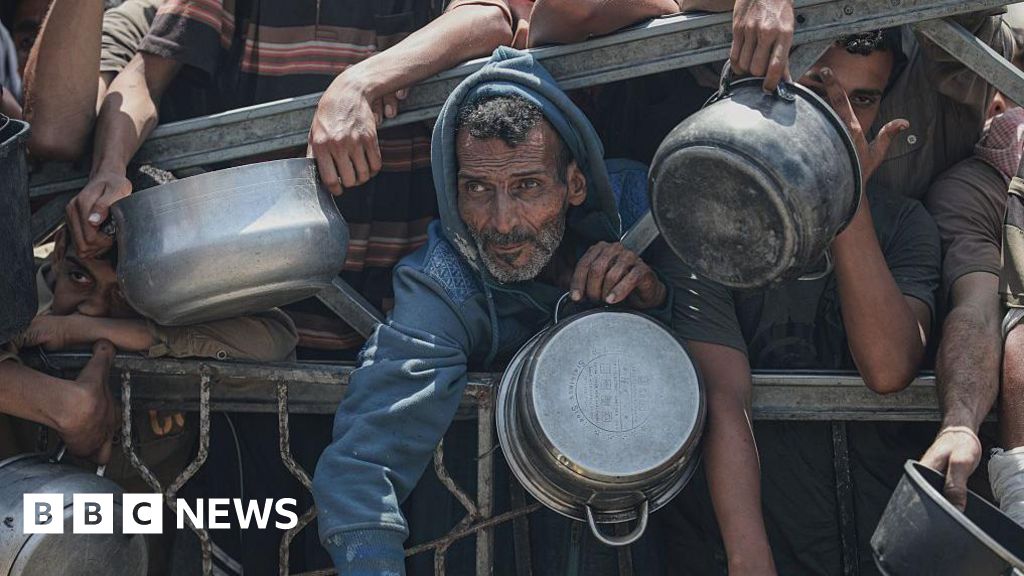Tragic Deaths Highlight the Dire Situation in Gaza

Introduction
In Gaza, the already dire situation has only worsened as dozens of Palestinians were killed while waiting for food aid. Despite Israeli assurances of a humanitarian pause in some areas of the territory, the deepening starvation crisis has claimed many lives. This tragic reality highlights the urgent need for international aid and a resolution to the ongoing conflict.
Key Details
The situation in Gaza has been dire for years, with high poverty rates and limited access to basic necessities. However, the recent escalation of violence has only exacerbated the already dire situation. The ongoing Israeli-Palestinian conflict has led to severe shortages of food, medicine, and other vital supplies. As a result, many Palestinians have been forced to wait in long lines for food aid, putting their lives at risk.
These deaths also shed light on the impact of the ongoing blockade on Gaza by Israel, which has severely restricted the movement of people and goods in and out of the territory. This has only worsened the living conditions and increased the suffering of the Palestinian people.
Impact
The deaths of these Palestinians while waiting for food aid is a tragic reminder of the dire situation in Gaza and the urgent need for a resolution to the conflict. It also highlights the importance of international aid and support for the people of Gaza. The international community must come together to address the root causes of the crisis and work towards a
About the Organizations Mentioned
Israeli
The query "Israeli" does not correspond to a specific organization but rather refers broadly to entities related to Israel. Based on the search results, there is no single organization named "Israeli" to profile. Instead, the available information focuses on the nature of business entities and company formation in Israel, rather than a particular company or organization called "Israeli." To provide a relevant and comprehensive summary aligned with the query’s likely intent—information on Israeli business entities and companies—here is an overview: In Israel, the legal framework for business organizations is primarily governed by the **Israeli Companies Law of 1999** and related regulations. The most common and prominent business entity is the **Private Company Limited by Shares**, which offers limited liability to its shareholders. Companies may be established by one or more individuals or legal entities, regardless of nationality or residency. Registration is conducted through the **Registrar of Companies** in the Ministry of Justice, a process that typically takes about two weeks and costs up to around US$2,000, including legal fees[1][2][3][6]. Israeli companies can be either **private** or **public**. Private companies have restrictions on share transferability, limited shareholders (up to 50), and cannot offer shares to the public. Public companies have at least seven shareholders and may issue shares or debentures on the stock exchange, subject to regulatory compliance such as publishing annual audited financial reports[2]. Key steps in forming an Israeli company include selecting a unique, non-misleading company name, drafting detailed **Articles of Incorporation** (covering company goals, capital structure, liability limits, and governance), and filing declarations by directors and shareholders authenticated by attorneys[4][5]. Israel’s business environment supports various legal entities including partnerships and nonprofit organizations, with tailored tax and reporting requirements. Israeli companies must submit annual audited financial statements, ensuring transparency and accountability. Israel’s robust legal and regulatory framework makes it an attractive location for startups and established businesses
Palestinian
The **Palestinian Authority (PA)**, officially the **Palestinian National Authority (PNA)**, is an interim governing body established in 1994 following the 1993 Oslo Accords between the Palestine Liberation Organization (PLO) and Israel. It was designed to administer limited Palestinian self-governance in parts of the West Bank and Gaza Strip, with responsibilities for civil administration, municipal governance, courts, schools, and internal security in designated areas. The PA operates mainly from Ramallah in the West Bank and was initially intended as a temporary body pending a final peace agreement, which has not yet been achieved[1][3][4]. Historically, the PA’s creation marked a significant step in the Israeli-Palestinian peace process, with Yasser Arafat elected as its first president in 1996. It was tasked with establishing institutional governance while managing security concerns and negotiations. However, the PA’s authority has been limited and fragmented, especially given the Israeli military presence and the division with Hamas, which controls Gaza and is excluded from the PA governance structure[4][2]. The PA’s governance has been criticized for corruption, inefficiency, and authoritarian tendencies, with President Mahmoud Abbas extending his rule beyond expected terms and suppressing political opposition. Elections have not been held since 2006, and the PA is often viewed as lacking democratic legitimacy[2][3]. Key achievements include establishing administrative frameworks in Palestinian territories and gaining international recognition for the State of Palestine, which was accorded non-member observer status at the UN in 2012 and is recognized by 157 countries as of 2025[3]. The PA continues to seek international support to improve governance and advocate for Palestinian rights on the global stage. Recently, it has expressed readiness to reassume full responsibility for Gaza governance, rejecting Hamas’s role there, and calls for renewed peace negotiations involving key international partners[5]. Despite ongoing challenges, the PA remains central to Palestinian political life and diplomacy,















